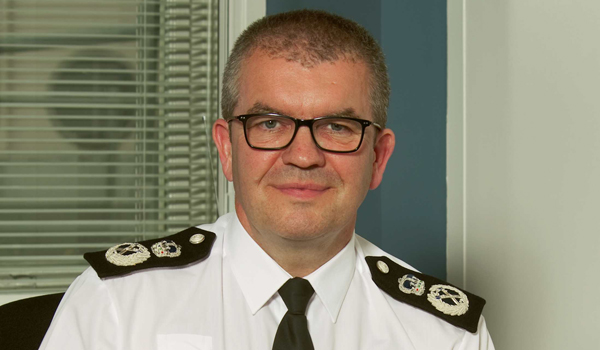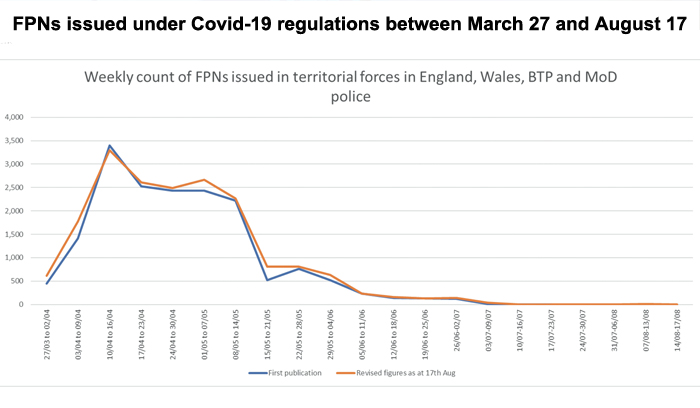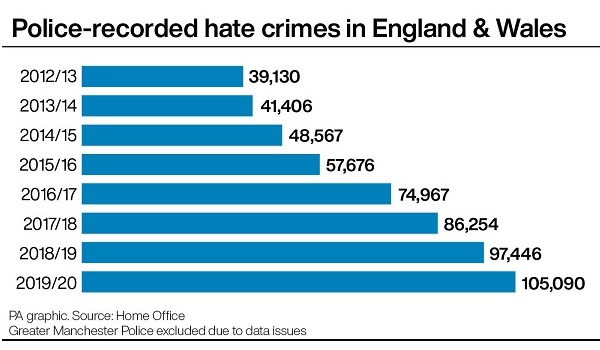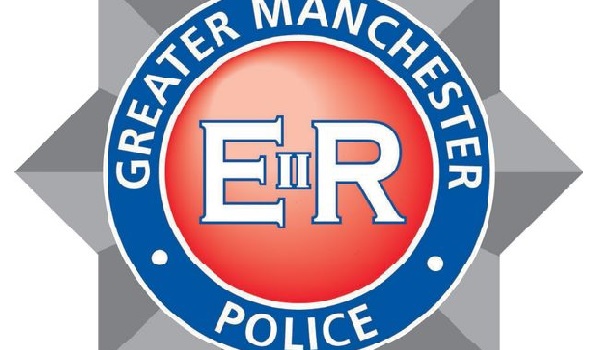‘Totally unacceptable’ surge in assaults on emergency services workers
Assaults on emergency service workers have risen by almost a third in the past year as latest figures show crime is returning to 2019 levels as lockdown restrictions ease.
National Police Chiefs’ Council (NPCC) chair Martin Hewitt said he was “disgusted” by the increase and promised the “the full force of the law” will be used to prosecute offenders
And Police Federation of England and Wales (PFEW) national vice-chair Ché Donald condemned the assaults as “a stain on society and totally unacceptable”.
The NPCC’s latest crime trends report shows assaults on emergency service workers have risen by 31 per cent compared to the same period last year.
It said the rise was largely due to increases in assaults without injury, which may be driven by scenarios such as common assault on staff.
Mr Hewitt said: “I am disgusted to see an increase in assaults on emergency service workers who are the frontline in protecting us all from this deadly virus. We will use the full force of the law to prosecute anyone who uses violence against those who are on the front line.”
Mr Donald said the figures show a shocking upwards trend.
“The stark fact that assaults on emergency service workers rose by almost a third compared to the same period last year is a stain on society and totally unacceptable,” he said.
“I am absolutely appalled by the huge surge in assaults against emergency workers. Police officers and other emergency workers who serve the public do not deserve to be assaulted for simply doing their jobs.
“Those who commit these despicable offences must be harshly dealt with by the courts and face the full force of the law.”
Mr Donald added: “PFEW will continue our campaign to increase sentences against those who assault us through our ‘Protect the Protectors’ campaign. It is vital to safeguard the physical and mental wellbeing of police officers and ensure courts issue tougher sentences for those who assault emergency service workers.”
Provisional data from police forces in England and Wales for the four weeks to August 2 shows police recorded crime is now just seven per cent lower than in the same period as 2019, as lockdown measures have eased.
This is the NPCC’s fifth crime trends update since the beginning of lockdown restrictions across England and Wales and indicates certain crime trends returning towards pre-lockdown levels.
Previous reporting showed a 28 per cent reduction for the four weeks to April 12, a 25 per cent fall for the four weeks to May 10, an 18 per cent fall in the four weeks to June 7, and a 12 per cent fall in recorded crime for the four weeks to July 5.
Mr Hewitt said: “One consequence of the restrictions was the reduction in crime. Sadly, we are now seeing crime getting closer to the levels we saw in 2019. Police forces are busy tackling and preventing crime and providing a policing service to their communities, while continuing to play their part in the national effort to limit the spread of coronavirus.”
Marked reductions were again recorded for residential burglary, vehicle crime (including theft of and from a vehicle), assaults (including both Grievous Bodily Harm and Actual Bodily Harm) and robbery and shoplifting. Forces have also continued to observe decreases, albeit at lower rates than previously reported, in 999 and 101 call volumes, by ten per cent and 12 per cent respectively.
Mr Hewitt said patrols were being “stepped up in problem spots” to enforce coronavirus restrictions.
In total, 18,683 notices have been issued under the Health Protection (Coronavirus, Restrictions) Regulations, England and Wales in England (16,021) and Wales (2,662) between Friday March 27 and Monday August 17.
In the last four-week period, 13 fines were issued by forces in England. No fines were issued in Wales under these regulations during this period.
The NPCC said 36 fines have been issued by police forces during localised restrictions, in line with regulations laid for each affected area.
Forty-six fixed penalty notices were issued between June 15 and 17 August 17 for breaches of the Face Coverings Regulations, 38 of these were issued against the regulations concerning wearing a face covering on public transport. Eight of the fines were issued against the regulations concerning the wearing a face covering in a relevant place, such as in a shop.
In this reporting period, three fines were issued to those failing to self-isolate after arriving in England, added the NPCC. These were issued in the Lincolnshire, Merseyside and Sussex police force areas.
“This only reflects fines issued by territorial police forces and does not include those from UK Border Force,” said the NPCC.
Mr Hewitt said: “Coronavirus is still a real and deadly threat. The restrictions across the UK are in place to limit the spread of the virus and save lives.
“Large gatherings both indoors and outdoors are still unlawful. And it is mandatory to wear face coverings on public transport, in shops and in some other enclosed spaces. Other local restrictions apply in some parts of the country.
“We all have a role to play limiting the spread of this deadly virus.
“Officers will continue to be out in communities – engaging, educating and encouraging people to be act responsibly to stop the spread of this virus – and patrols are being stepped up in problem spots. We will enforce where necessary.
“Those who flout the regulations risk a fine of £100 – halving to £50 if paid within 14 days. Those organising or facilitating unlawful gatherings face fines of £10,000.
“As restrictions ease across the country, people will want to go out and enjoy themselves but this needs to be done in a socially responsible manner, within the law, and with due regard for everyone’s safety.”








